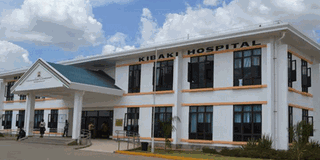Victims of gender-based violence need more access to care and justice

Mama Lucy Kibaki Hospital where Médecins Sans Frontières has implemented a simplified and integrated model using nurses as first-line responders to gender-based violence. FILE PHOTO | NATION MEDIA GROUP
What you need to know:
- According to the 2014 Kenya Demographic and Health Survey, 45 per cent of Kenyans aged between 15 and 49 had experienced physical violence since the age of 15. Of these, 56 per cent of women and 72 per cent of men had not sought assistance to put an end to the violence.
- Too few health facilities in Kenya today have the necessary means to implement gender-based violence care, lacking dedicated trained staff and sufficient resources.
- In MSF supported facilities, around 80 per cent of the victims are admitted within 72 hours.
Last week, the Kenyan government together with the United Nations launched the National Program to address gender-based violence. This is a positive step that shows a growing awareness at the highest levels of a nation-wide issue that requires more coordinated effort from all actors involved.
Médecins Sans Frontières has been providing medical care for victims in Nairobi Eastlands since 2008, with a focus on sexual violence. Last year, our teams treated more than 2,500 patients and the vast majority (>90 per cent) were female. More than half were aged below 18. This is currently our largest gender-based violence project worldwide.
According to the 2014 Kenya Demographic and Health Survey, 45 per cent of Kenyans aged between 15 and 49 had experienced physical violence since the age of 15. Of these, 56 per cent of women and 72 per cent of men had not sought assistance to put an end to the violence.
LOOKING FOR VICTIMS
Community mobilization and, foremost, networking with all institutions likely to encounter victims of gender-based violence have been key in improving their access to the MSF clinic. Half of the patients we see today are referred by the authorities (police and chiefs for example), which clearly demonstrate the value of linking up across sectors to ensure victims can access appropriate care.
Receiving care quickly is also crucial, as treatment provided within 72 hours of an assault is much more effective at preventing the transmission of sexually transmitted diseases such as HIV and/or unwanted pregnancies. It also helps ensure the collection of any quality forensic evidence for legal purposes.
In Eastlands, MSF’s hot line number coupled with a free ambulance service, as well as the introduction of specialized nurses in two additional structures have proven that a quick response can be achieved if care is brought as close as possible to victims. In MSF supported facilities, around 80 per cent of the victims are admitted within 72 hours.
THE NURSE-DRIVEN MODEL
Too few health facilities in Kenya today have the necessary means to implement gender-based violence care, lacking dedicated trained staff and sufficient resources. In close collaboration with the Ministry of Health and Nairobi County, MSF implemented a year ago a simplified and integrated model using nurses as first-line responders in Makadara health centre and Mama Lucy Kibaki hospital.
Nurses with the appropriate training provide the initial treatment and counselling, and then refer patients to a higher level of care or other services when needed. Such model could help decentralize and expand gender-based violence care throughout Kenya if most health facilities in the country would incorporate this capacity.
JUSTICE FOR SURVIVORS
Such a “nurse-driven model” has been proven effective in countries like the United States or South Africa. It did not only improve the quality of care but also enhanced the timely collection of forensic evidence that is potentially a determining factor for any formal investigation.
Unfortunately, such evidence remains seldom used in Kenya. In 2015 MSF collected 608 positive vaginal swabs that could have undergone matching with a rapist’s DNA. The police eventually retained 11 for analysis.
Failure to prosecute does not encourage victims of gender-based violence to seek justice, and it can even jeopardize their safety. Gender-based violence is a crime that can only be addressed through strengthened coordination between health professionals, the police and judiciary actors.
William Hennequin is the head of mission for Médecins Sans Frontières (Doctors Without Borders) in Kenya.





